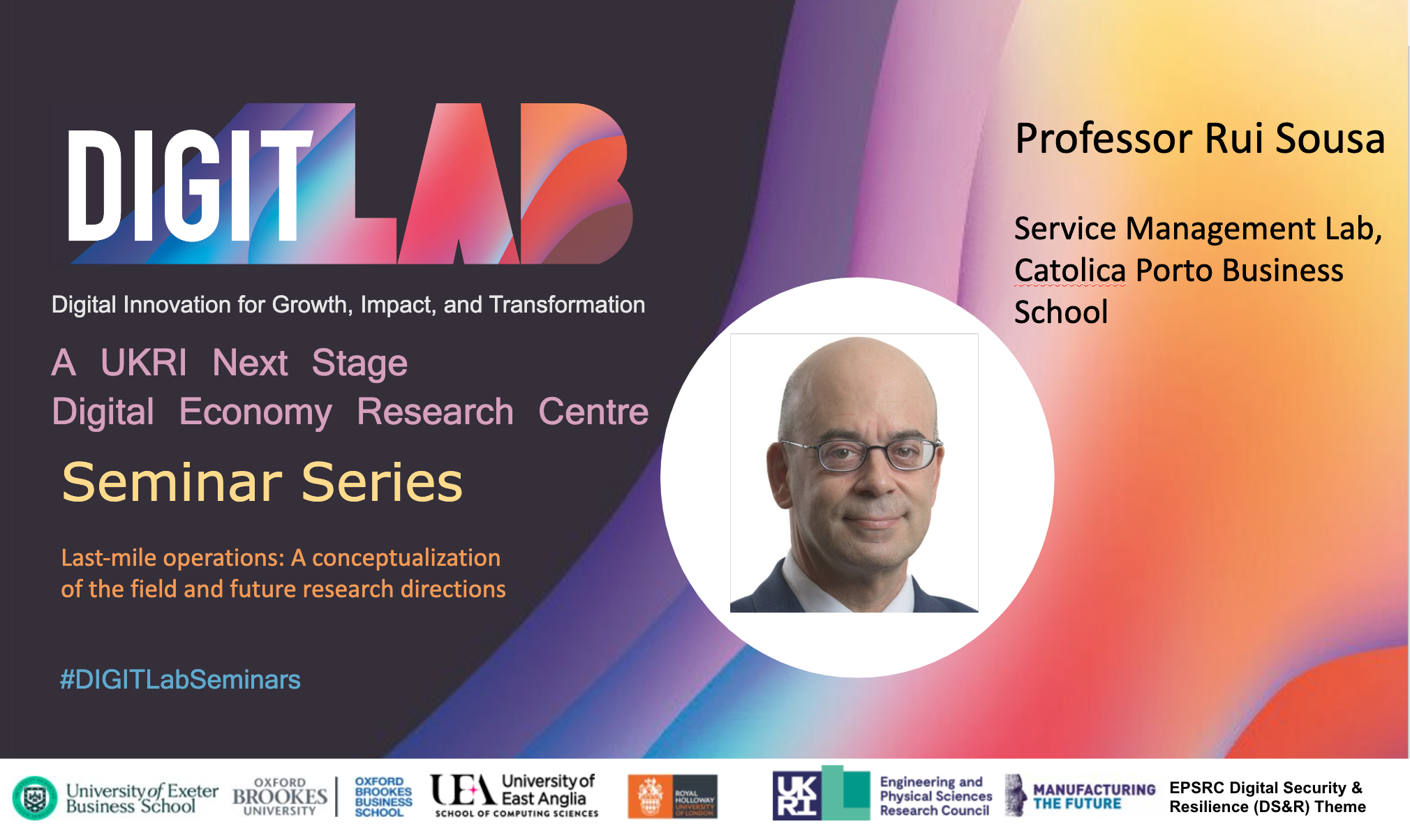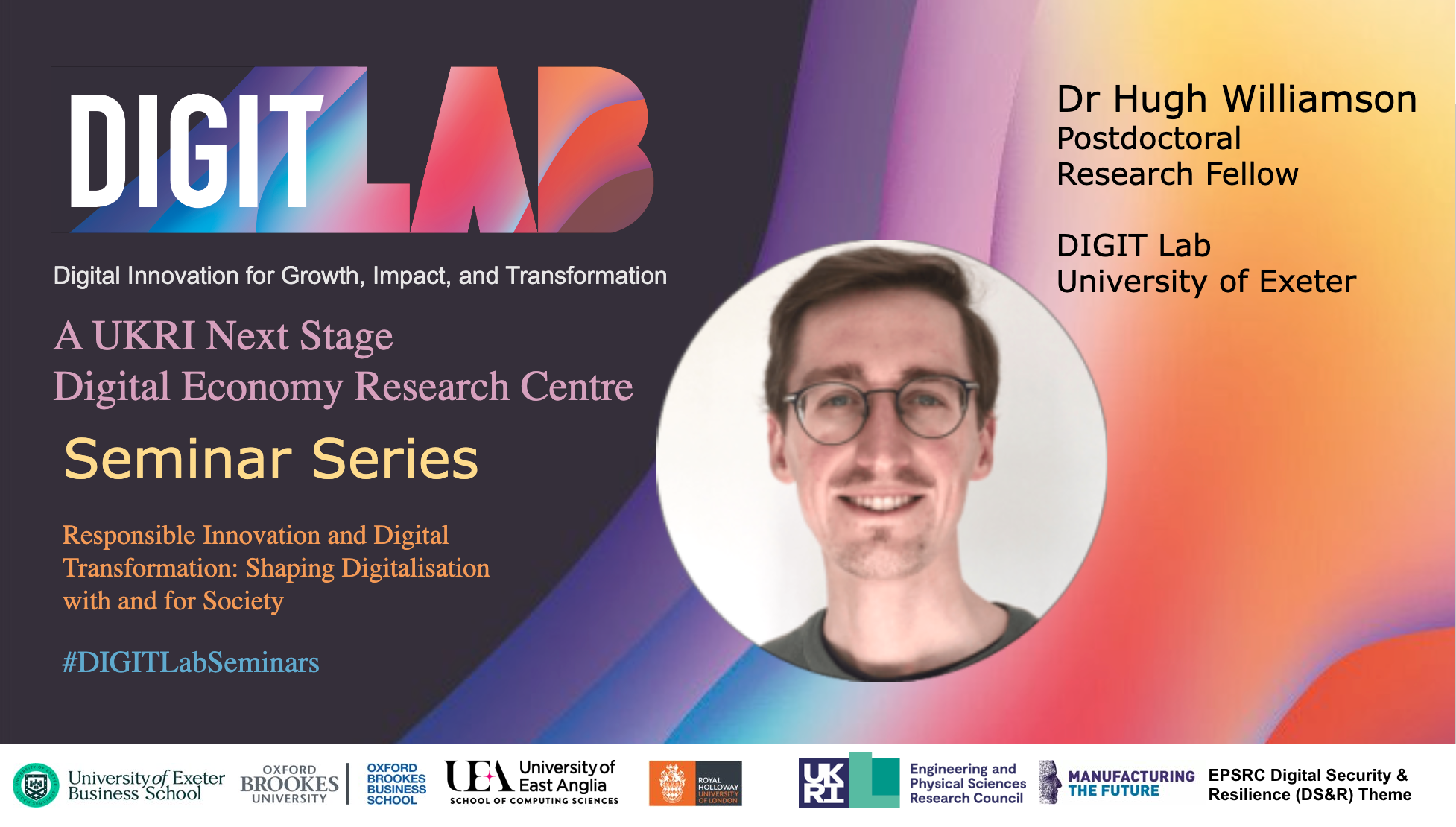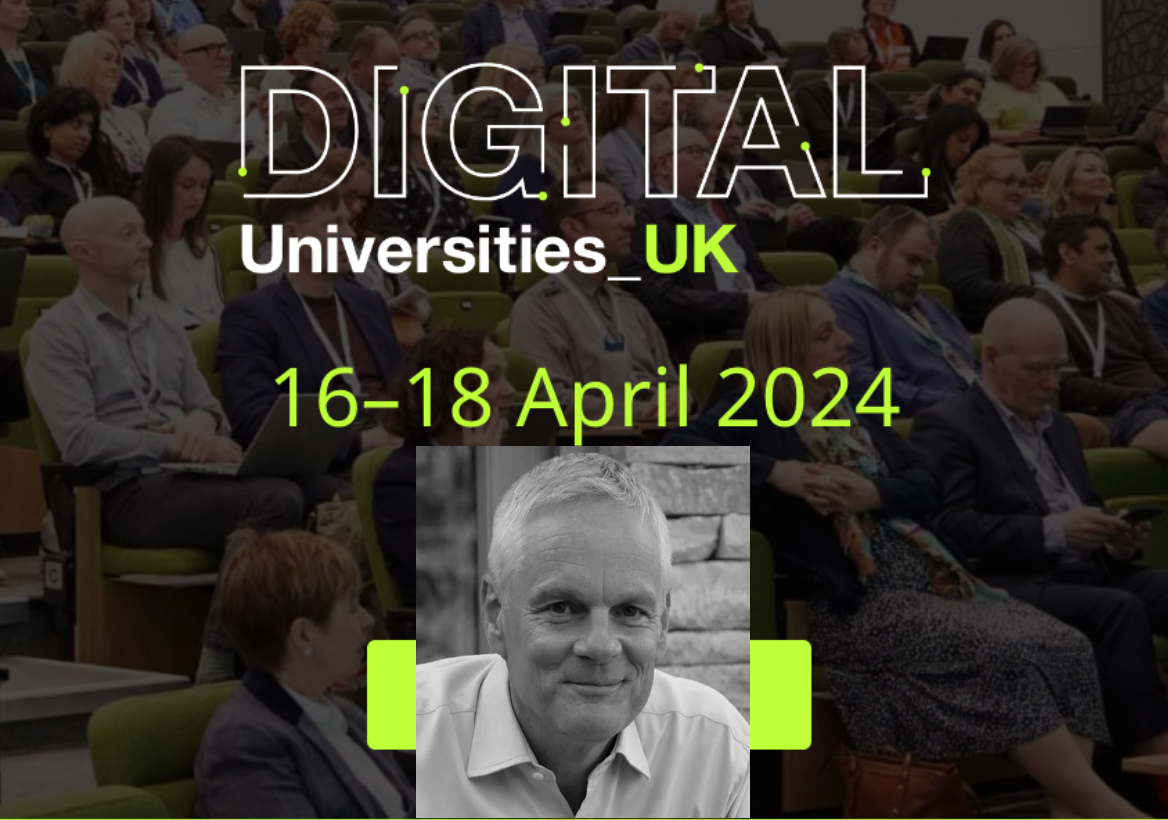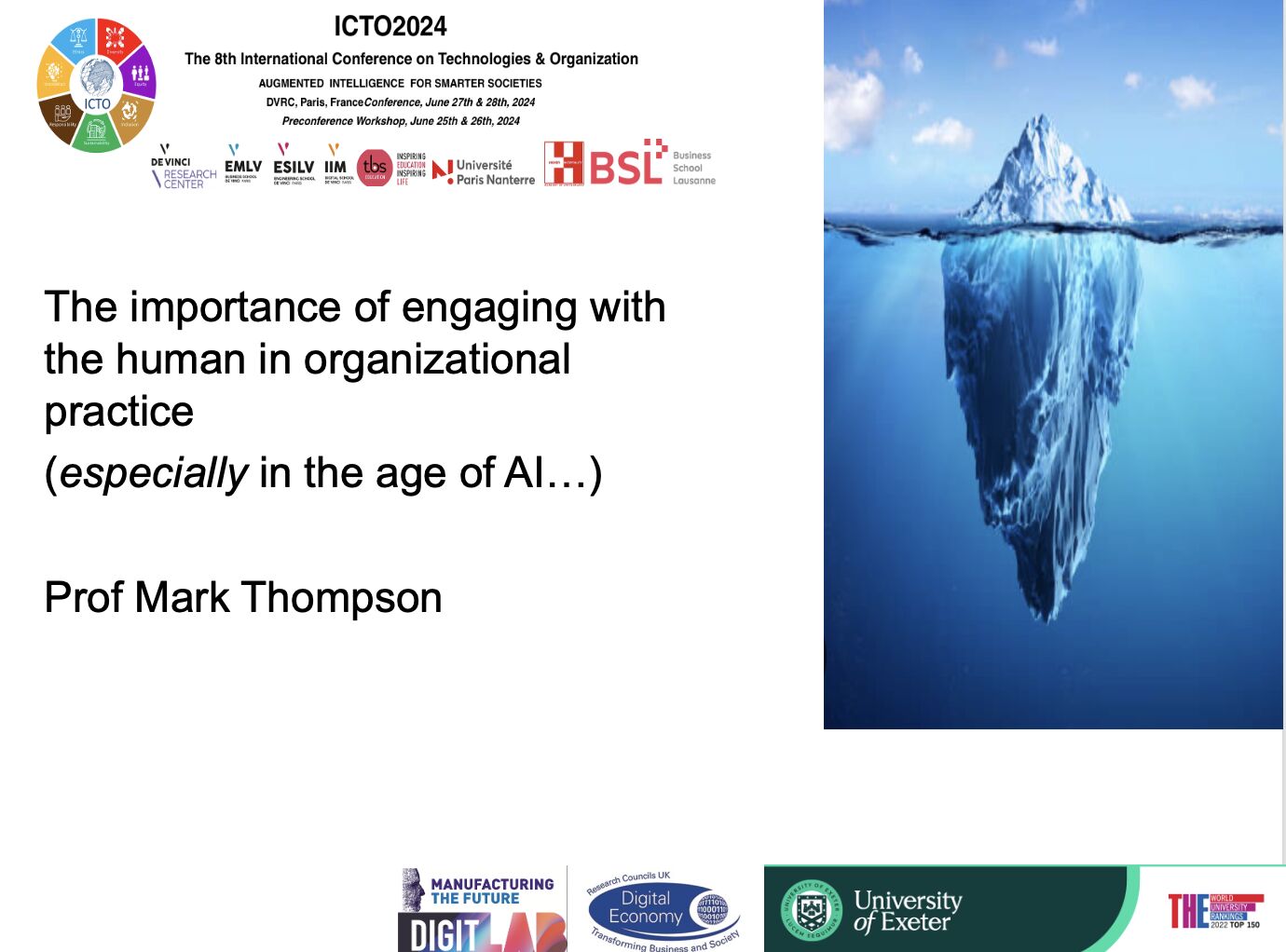By Alan Brown, Director, DIGIT Lab
It was great last week to participate in the Digital Transformation conference organized by BT’s Tommy Flowers Network and supported by the DIGIT Lab centre. This brought together a range of experienced speakers for short, inspiring talks and panel discussions on the key themes we’re facing as we address the challenges of our digitally disrupted environment. You can find full details of the conference here.
The virtual conference consisted of two 3-hour sessions over 2 days, with speakers given 15 minutes to provide their views on how advances in digital transformation research can best be aligned to drive the current state-of-the-practice. The range of perspectives offered in these sessions can be seen in a brief summary of each of the speakers and their key points:
- Tim Whitely, BT’s Managing Director for Applied Research, began the conference with some opening thoughts on the opportunities and challenges we face as we enter the next phase of digital technology adoption.
- Esra Kasapoglu, UKRI’s research director for AI and Data Economy, discussed the broad focus for research funding in this area and highlighted the importance of ensuring a diverse approach to strengthen the quality and applicability of research.
- Gerard Parr, Professor and Head of the school of computer sciences at the University of East Anglia, identified some of the key challenges faced by large established organizations (LEOs) as they adopt digital technologies. He also provided an overview of the DIGIT Lab centre and its role to accelerate digital transformation in LEOs.
- Sally Howes, Council member of the University of East Anglia and a digital technology advisor, considered the recent digital transformation experiences in the UK government. While she acknowledged the challenges they face due to the scale and prevalent culture of stability, she was keen to also highlight the successes that have enabled quality and performance improvements in recent years.
- Stephen Cassidy, a senior BT researcher in behaviours, organizations, and systems, raised several important research questions we face as we look to adopt digital technologies and the architectural implications for the digital infrastructure supporting them.
- Will Venters, assistant professor in information systems at the LSE, focused on the disruptive nature of digital technology and encouraged us to consider the ongoing change from the perspective of a continuous digital flow rather than a series of discrete upgrades.
- Rahim Tafazolli, Regus Professor of Electrical Engineering at the University of Surrey, introduced us to the key principles driving research in 6G mobile technology based on low latency, time synchronization, and sensing technology. He suggested these advances will support a new wave of digital innovation over the coming years.
- Kevin Lee, BT’s Chief Digital Officer, provided a broad summary of the ways that the availability of vast amounts of digital data are changing our industries and reshaping society. He pointed to several important research areas where focus is required to accelerate this journey.
- Theo Kanellos, Head of business development and commercial alliances at Zoetis, looked at the implications of digitally driven innovation in the animal health domain. He explored how digital health provides a fascinating example of the way our lives are changing due to rapid advances in digital technology adoption.
- Yvonne Gallagher, director of digital for the National Audit Office, considered recent investigations into digital transformation in large UK government programmes. She highlighted some of the challenges faced in these multi-year change initiatives and identified areas of focus to improve their future performance.
- Paul Gosling, Chief Technology Officer for Thales UK, gave insights to a variety of examples of advanced technologies being developed in the aerospace, defence, and transportation fields. He highlighted how a broader systems engineering perspective was essential to address the many different facets of these solutions.
- Marc Geall, senior executive at SAP and Chief Operating Officer for their cloud and analytics products, discussed the evolution of the SAP platform from its roots as a mainframe-based solution for managing back-office processes to now be a key platform for logistics and performance analytics across the organization.
- Ben Azvine, BT’s global head of security research and innovation, brought us back to one of the key operational concerns with large-scale digital technology adoption: security. He explained how addressing security threats is a high priority for all organizations, and he detailed some of the key steps to be taken to ensure they are resilient and trustworthy.
A Personal Reflection
Each of the presentations provided an important perspective on the way digital transformation is impacting all of our lives. And while it was valuable to hear them individually, I was particularly intrigued to be able to assess this kaleidoscope of perspectives as a way to understand more about the current state of digital technology adoption and the key challenges we face today.
From my personal viewpoint, I drew three main conclusions from this event.
Data as a fundamental concern
First, all the speakers made reference to the role, nature, and characteristics of data as a fundamental concern. Managing data and its relationships is at the heart of digital transformation whether it is operational data about performance of the network infrastructure, or application data about the welfare of animals or the location of facilities. Perspectives on how to achieve this varied widely. Yet, underlying many of the concerns were fundamental questions about data quality, trustworthiness, timeliness, and accuracy. Several speakers highlighted the importance of increasing data handling skills at all levels in organizations.
Types of Digital Transformation
Second, digital transformation was viewed rather differently based on the target for the transformation. Three approaches can readily be distinguished from the speakers’ experiences:
- Digital transformation in the organization. The goal is to improve the operational aspects of the organization by reducing waste, improving processes, automating repeating tasks, and so on.
- Digital transformation in the client. The target is client improvements through better products and services enabled by learning more about client behaviours, adapting quickly to changing circumstances, receiving more feedback from products in use, and so on.
- Digital transformation in society. The aim is to improve understanding of the impacts of digital disruption in our lives. As we adopt digital ways of working, fundamental adjustments must be made in how we view our lives, create value in our businesses, collaborate around new ideas, change our relationship with key technologies, and so on.
Digital Transformation can be overwhelming
Third, no matter the perspective or domain, the challenges of “transformation” can be overwhelming when dealing with the impacts of scale, heritage, and cultural inertia. Regardless of the domain, sustaining widescale use of digital technologies requires careful consideration for the effects of the technology on many different aspects of the people, systems, and organizations they touch. Some of these impacts, such as changes in working practices, are easy to see and require a direct approach to overcome. Yet, even here, the demands of day-to-day activities are obscuring progress.
However, many transformation challenges are much more subtle involving an individual’s attitudes to digital technology changing their role and responsibility, the trust we have in automated decision making, and the experiences, heritage, and governance approaches specific to each organization. Addressing them requires a wide collection of techniques. Most large established organizations appear to be in the early stages of understanding and dealing with these concerns.
Seize the ‘Digital’ opportunity
We need change now; we can’t afford to wait, and we can’t just be innovating in an ad-hoc way. So get involved in DIGIT Lab today











